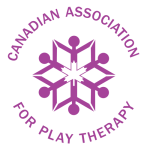
2025 NDPT and Filial Therapy May 13-14
Overview
Non-Directive
Play Therapy is the most prominent model of play therapy.
Child-centered play therapy was developed by Virginia Axline based on
the principles Client-Centered Therapy by Carl Rogers. Its premise is
that if a therapist creates a safe therapeutic environment a child will
initiate the therapeutic work they need to do to resolve presenting
issues. It is an evidence-based therapeutic intervention for children
ages 3-12 and older.
Play
is a child’s natural medium of communication, symbolic language. Play
serves important child developmental purposes including motor, social,
emotional, intellectual and mastery. Play represents the child’s attempt
to organize and integrate their experiences and internal world. It is
by expressing, through play – the process of externalizing the images
and symbols from the inner world, through a creative medium that is
witnessed in sensory form and honoured by a skilled and trained
therapist who is fully present – that a deeper level of growth and
healing occur. Child-Centered Play Therapy is an empirically supported
approach that helps children express feelings, heal trauma, develop
emotional regulation and problem-solving skills, and enhance
self-esteem.
Filial Therapy is a
highly effective empirically-supported intervention integrating family
therapy and play therapy to address child and family problems.
Therapists learn how to train and supervise parents as they conduct
special child-centered play sessions with their own children, an
approach designed to resolve presenting problems while strengthening
family relationships. It facilitates positive and long-lasting child and
family change. Filial therapy has been used in many different settings
and has been embraced by many cultural and ethnic groups throughout the
world because of its respectful involvement of parents as partners in
the process of family change.
